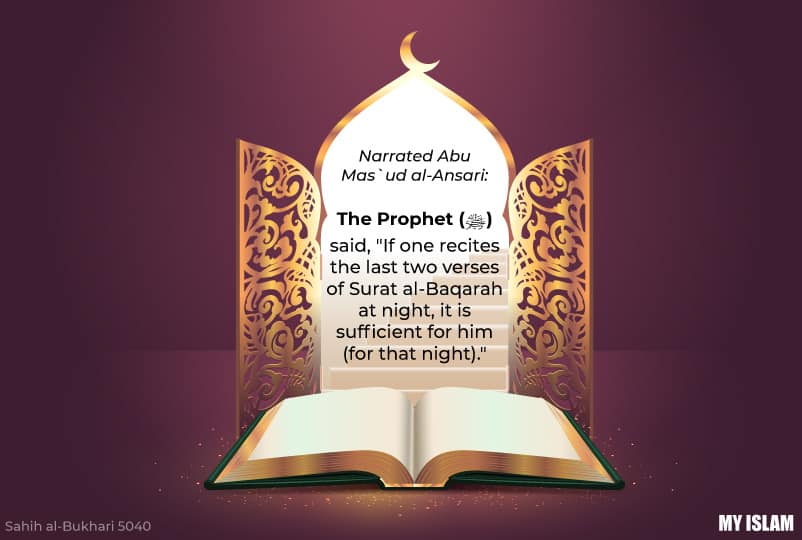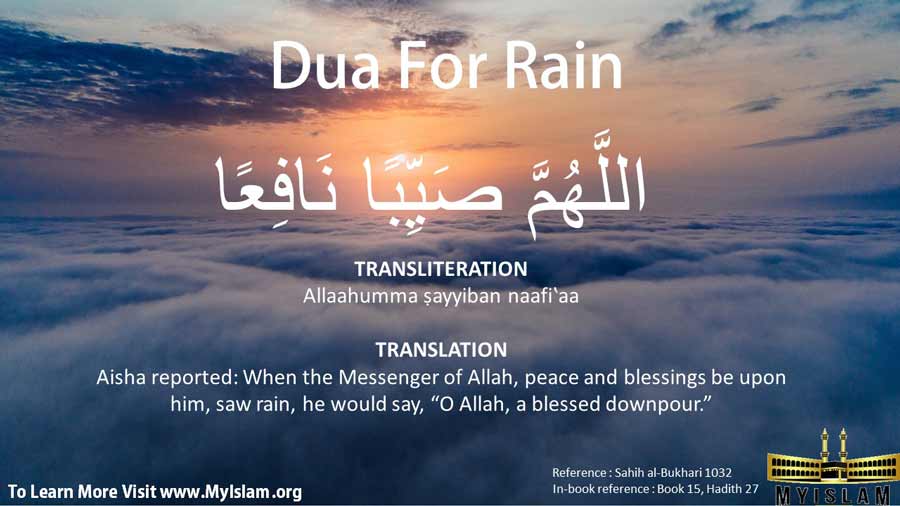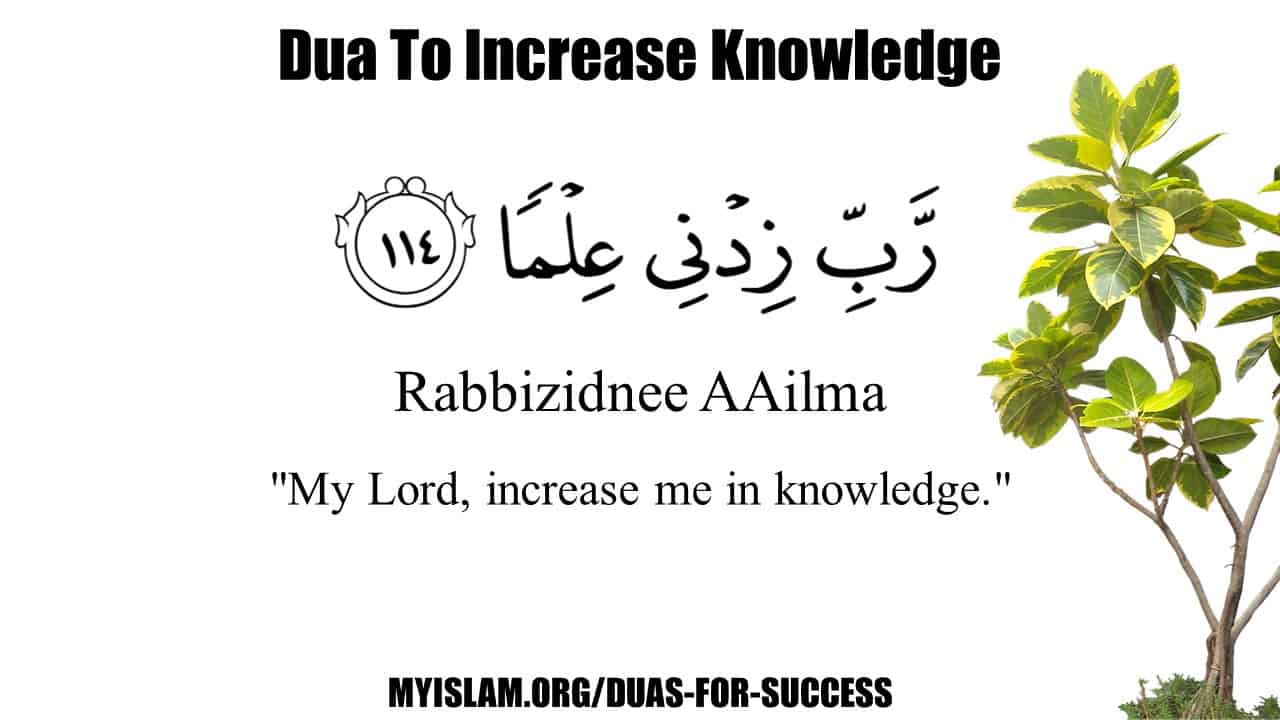
The last 2 ayat of Surah Baqarah (commonly referred to as Amana Rasul ayat) are two fairly short ayats that contain a lot of barakah (blessings). From Bukhari, we are told these two ayat are sufficient for anyone who will read them at night.
The first ayah is a statement of faith and true belief while the second verse contains three supplications to Allah (swt).
Insha-Allah we’ll explore both these ayat in detail:
Surah Baqarah verse285:
آمَنَ الرَّسُولُ بِمَا أُنْزِلَ إِلَيْهِ مِنْ رَبِّهِ وَالْمُؤْمِنُونَ ۚ كُلٌّ آمَنَ بِاللَّهِ وَمَلَائِكَتِهِ وَكُتُبِهِ وَرُسُلِهِ لَا نُفَرِّقُ بَيْنَ أَحَدٍ مِنْ رُسُلِهِ ۚ وَقَالُوا سَمِعْنَا وَأَطَعْنَا ۖ غُفْرَانَكَ رَبَّنَا وَإِلَيْكَ الْمَصِيرُ
Aamanar-Rasoolu bimaaa unzila ilaihi mir-Rabbihee walmu’minoon; kullun aamana billaahi wa Malaaa’ikathihee wa Kutubhihee wa Rusulihee laa nufarriqu baina ahadim-mir-Rusulih wa qaaloo sami’naa wa ata’naa ghufraanaka Rabbanaa wa ilaikal-maseer
“The Messenger [Muhammad (Peace be upon him)] believes in what has been sent down to him from his Lord, and [so do] the believers. Each one believes in Allah, His Angels, His Books, and His Messengers. They say: “We make no distinction between one another of His Messengers” – and they say: “We hear, and we obey. [We seek] Your Forgiveness, our Lord, and to You is the return [of all].”
Surah Baqarah Ayat 285
These verses are very comprehensive and encapsulate what it truly means to be a Muslim. It gives us a framework teaching us what we are required to believe in, the values we should uphold, and the ethics of our conduct. “Each one believes in Allah and His angels and His Books and His Messengers. […] We do not differentiate between any of His Messengers.” This one ayah encompasses 5 articles of faith:
- To believe in the Oneness of Allah (tawheed).
- To believe in all His Angels.
- To believe in all His Books.
- To believe in all His Prophets.
- To believe in the Day of Resurrection.
The general belief is that this ayah is a reference to the Night of Journey (Isra and Mi’raj) where Prophet Muhammad (ﷺ) ascended to Jannah.
See hadith reference
It was narrated that Ibn Abbas said:
“When Jibril was with the Messenger of Allah (ﷺ), he heard a sound from above like a door opening. Jibril, peace be upon him, looked up toward the sky and said: ‘This is a gate in Heaven that has been opened, but it was never opened before.” He said: “An Angel came down from it and came to the Prophet (ﷺ) and said: ‘Receive the glad tidings of two lights that have been given to you and were never given to any prophet before you: The Opening of the Book (Al-Fatihah) and the last verses of Surat Al-Baqarah. You will never recite a single letter of them but you will be granted it.'”
Sahih (Darussalam)
Sunan an-Nasa’i 912
Here Allah (swt) says, “The Messenger [Muhammad (ﷺ)] believes in what has been sent down to him from his Lord” but he doesn’t only mention the imaan of the Prophet, he also includes “And so do the believers” referring to the entire Ummah. In this response we are directly mentioned with the Prophet (ﷺ), we are the last Ummah on earth and he commended us for being among the believers. All the communities Allah previously sent guidance for have either perished or been led astray.
Next it mentions, laa nufarriqu baina ahadim-mir-Rusulih “We do not differentiate between any of His Messengers”.
Islam respects and honors every Prophet equally and Prophet Muhammad (ﷺ) was mindful to remember the struggle the other Prophets had faced with guiding their communities. This often gave him comfort knowing he was not alone during the difficulties and gave him the courage to persevere just as they had. This is also a reminder to us that we should not just study the life and teachings of Rasulullah (ﷺ) but learn about the lives of all the Prophets (may peace be upon them).
In Surah An-Nisa, it mentions those who disbelieve will say, “We hear and disobey” and “hear but not heard” (4:46). Contrast this to how a believer would respond according to this ayah, sami’naa wa ata’naa meaning, “We hear, and we obey”.
There are two parts to this, first, we must actively listen and hear the message, and the second is we obeyed. When it comes to Allah we act, there is no questioning or doubt, we listened, and we obeyed. Do we obey one hundred percent of the time? No, we are not perfect, in life we’re going to make mistakes. This is why the verse finishes seeking His abundant forgiveness, ghufraanaka Rabbanaa wa ilaikal-maseer, meaning “[We seek] Your Forgiveness, our Lord, and to You is the return [of all].”
In psychology, there is a concept known as social proof that describes how we look to others to inform our own opinions and beliefs. The human condition is memetic in nature, meaning we like to copy others when we ourselves are uncertain how to behave.
An example of social proof at work, imagine a few hundred people running down an alley you were walking. Would you join the crowd and run in the same direction, trusting that they were escaping from some fast-approaching danger? Or would you dare to step aside and let the crowd go by so that you could find out for yourself? Chances are you would take the former approach and run, and rightfully so. This is a natural human reaction to use social cues for survival and in this situation following the crowd could be the difference between life and death. Here your gut instinct would have served you well but there are situations where that’s not always clear.
We really must grow to appreciate what Prophet Muhammad (ﷺ) sacrificed for us, he risked his life for the message and if it weren’t for him, we wouldn’t be where we are.
Remember he was at the age of forty when it was revealed to him by Jibreel that he was the Messenger of Allah. He was in denial himself and needed to be affirmed. When he finally accepted his role, he now had to fight against the commonly held beliefs and practices in Mecca. People were not receptive to this foreign message and began ostracizing Muhammad (ﷺ).
They began to think he was insane, we learn in the Qur’an his own uncle Abu Lahab staunchly opposed Islam and openly campaigned against him. When Prophet Muhammad’s (ﷺ) movement began to gain traction and some high-profile conversions the other tribes viewed it as a threat. They argued if Muhammad (ﷺ) was against the traditional social and religious values of Mecca then he must be prepared to endure separately from its economy. This sanction was an attempt to put internal pressure within his clan to outlaw Muhammad (ﷺ) or force him to abandon his movement because of the effect the crippling sanctions would inevitably have (i.e. hunger and personal humiliation).
It’s a difficult task to not follow the masses, but if you followed Abu Lahab and others you would’ve been misled. In moments like this, we need to practice independent thinking rather than assuming the masses are correct just because they have the numbers.
If you existed in the Prophet’s (ﷺ) time, what you could’ve done to protect yourself is to listen with an open mind and try to be a student of the truth and decide for yourself. Learn both sides of the argument to the extent you know the other sides view better than they know it.
Surah Baqarah Verse 286
لَا يُكَلِّفُ اللَّهُ نَفْسًا إِلَّا وُسْعَهَا ۚ لَهَا مَا كَسَبَتْ وَعَلَيْهَا مَا اكْتَسَبَتْ ۗ رَبَّنَا لَا تُؤَاخِذْنَا إِنْ نَسِينَا أَوْ أَخْطَأْنَا ۚ رَبَّنَا وَلَا تَحْمِلْ عَلَيْنَا إِصْرًا كَمَا حَمَلْتَهُ عَلَى الَّذِينَ مِنْ قَبْلِنَا ۚ رَبَّنَا وَلَا تُحَمِّلْنَا مَا لَا طَاقَةَ لَنَا بِهِ ۖ وَاعْفُ عَنَّا وَاغْفِرْ لَنَا وَارْحَمْنَا ۚ أَنْتَ مَوْلَانَا فَانْصُرْنَا عَلَى الْقَوْمِ الْكَافِرِينَ
Laa yukalliful-laahu nafsan illaa wus’ahaa; lahaa maa kasabat wa ‘alaihaa maktasabat; Rabbanaa laa tu’aakhiznaaa in naseenaaa aw akhtaanaa; Rabbanaa wa laa tahmil-‘alainaaa isran kamaa hamaltahoo ‘alal-lazeena min qablinaa; Rabbanaa wa laa tuhammilnaa maa laa taaqata lanaa bih; wa’fu ‘annaa waghfir lanaa warhamnaa; Anta mawlaanaa fansurnaa ‘alal qawmil kaafireen (section 40)
“Allah does not charge a soul except [with that within] its capacity. It will have [the consequence of] what [good] it has gained, and it will bear [the consequence of] what [evil] it has earned. “Our Lord, do not impose blame upon us if we have forgotten or erred. Our Lord, and lay not upon us a burden like that which You laid upon those before us. Our Lord, and burden us not with that which we have no ability to bear. And pardon us; and forgive us; and have mercy upon us. You are our protector, so give us victory over the disbelieving people.”
Surah Baqarah Ayat 286
In the last verse of Surah Baqarah, Allah describes the resilience and strength the human spirit possesses, “Allah does not charge a soul except [with that within] its capacity.” This is why it’s important for us to avoid complaining at all costs, it is a disease of the mind that will never improve the situation. Spend a second complaining and you have wasted a second. When you complain, what you are really doing is making yourself out to be the victim and unknowingly blaming individual tests we all must face. Instead, it is much better for you to make the choice and view yourself as a survivor rather than a victim when a calamity strikes.
This does not mean we should be embarrassed or ashamed of crying or feeling weak. We learned that Prophet Yaqub (as) cried so much his vision became impaired. Suffering is inescapable, letting the tears fall shows that you have the courage to work through the pain. In Surah Yusuf Ayat 86 Yaqub (as) says, “I only complain of my suffering and my grief to Allah, and I know from Allah that which you do not know.” Complaining outwardly to everyone but Allah is the thief of patience.
And when we make du’a we shouldn’t ask for less on our plate, we should instead make du’a asking that we become more skillful and triumphant in the battles we face. Allah in the Qur’an directly says, “And We will surely test you with something of fear and hunger and a loss of wealth and lives and fruits, but give good tidings to the patient,” (2:155). Accept that test you are given and fight through it with courage.
See hadith reference
The Prophet (ﷺ) passed by a woman who was weeping beside a grave. He told her to fear Allah and be patient. She said to him, “Go away, for you have not been afflicted with a calamity like mine.” And she did not recognize him. Then she was informed that he was the Prophet (ﷺ). so she went to the house of the Prophet (ﷺ) and there she did not find any guard. Then she said to him, “I did not recognize you.” He said, “Verily, the patience is at the first stroke of a calamity.”
Sahih al-Bukhari 1283
One thing you can be sure of is Allah (swt) will never burden you with more than you were capable of shouldering. Say to yourself out loud, “I got this!” because Allah has created you capable. We are not aware of the strength of the human spirit; we constantly underestimate what we can achieve. It is only until we are pushed beyond what we thought was possible do we realize the inner strength we have. Don’t underestimate what your able to do. If you spend enough time, do the repetitions, acquire the right knowledge, you’ll be further along than you ever could’ve imagined. Seek help or advice from others, this is not a form of complaining but a sign of maturity.
We also need to shift our perspective on suffering; blessings and burdens are not always mutually exclusive. There is a gift-wrapped somewhere in your suffering, you just need to dig deep enough to uncover it. From the Russian psychologist Dostoyevsky, “There is only one thing that I dread: not to be worthy of my sufferings”. The way we view our experiences and the story we tell ourselves about them is all that matters.
It is always best that we say Alhamdulillah and accept both the good and the bad of life. We don’t know what Allah could be saving us from when things don’t the way we planned. When Thomas Edison was asked what it felt like to fail 1000 times when inventing the light bulb Edison replied, “I didn’t fail 1,000 times. The light bulb was an invention with 1,000 steps.” Each failure was not viewed as a personal shortcoming of Edison but represented progress, moving a step closer to getting it right. The opportunity lies in the way we wear our burden and how we let it define us.
Remember the saying, those who think they can and those who think they can’t are both normally right.
There is a second meaning of this ayah which is often overlooked but just as important. Allah is telling us to go and live a productive and purposeful life by finding and bearing the largest burden you possibly can. To pick up the heaviest thing you can lift and carry it. We need to accept full autonomy over our lives and to push ourselves to our fullest potential. It is no one else’s responsibility but yours to understand and to develop specific strengths and play to them. If you find that you’re naturally creative, find ways in which you use this talent to serve humanity for the better. Cultivate and hone this skill over years and use it to bring others into fold of Islam, “And when it is said to them, “Spend from that which Allah has provided for you,” those who disbelieve say to those who believe, “Should we feed one whom, if Allah had willed, He would have fed? You are not but in clear error.” (36:47)
All the Prophets subscribed to this notion of adopting full responsibility. They dedicated their entire being to serve their communities and to be of service. A fulfilling life is a life of service. It’s often quoted, “if you help enough people get what they want you’ll have everything you want”.
Do you know what place on earth has the most wealth? (the answer is not what you expect). It’s said the wealthiest place on the planet is the cemetery. Here you will find inventions never created, cures never discovered, hopes, and dreams that never became a reality because people were paralyzed by fear. Fear of failure, fear of judgment, fear of just not being good enough. We need to ignore all that. Begin by putting in the effort, day by day, and take things slowly. We often fail before we begin because we shoot ourselves in the foot. We have the idea of what the end-goal should be and don’t believe it’s possible for us, so we don’t even try. If we shift the goal, ignoring the end, and focus on going to bed a little bit better and wiser than when we first woke up, you’ll make huge advancements. Sustain that over a lifetime, and you’ll end up living a life much greater than you ever anticipated. You’ll know you did not go through life unused.
The ayah continues and warns us that we, “will have [the consequence of] what [good] it has gained, and it will bear [the consequence of] what [evil] it has earned.” Meaning you will reap the harvest of whatever you plant, if you plant bad you reap bad. Things have an interesting way of coming back around. You can’t get what you need without having first planted the seed, it’s like a person who plays video games all day and wonders why he or she can’t their dream job.
Similarly, on the day of qiyamah, every being will be rewarded for the services they rendered. Whatever good or bad deeds will be stacked in front of them and here they face the consequence of what one has earned.
The verse then breaks into three beautiful supplications asking Allah for strength, forgiveness, victory, and for his protection.




Beautiful and inspiring verses of the Qur’an. There are a lot to learn from these two verses. May Allah give us the strength to apply the teachings of these verses in our life.
JazakaAllah Khairan
May Allah grant us the ability to learn more of Islam and teach others
MasyaAllah. Im so blessed to come across this page. Im so impressed with the knowledge shared. After reading the explanation on the last two verses of surah Al Baqarah, it is an eye opener. Adding some facts / stories/ science / psychology made the information beyond meaningful and have an impact in one’s mind. Jazakallahu khair
Brother thank you for wonderful tafsir of the two verses. To my understanding I can summarise your explanation as this. ‘AlhamdulilLah Rabbil Alamin.’
I wouldn’t really say that my commentary on these two verses constitutes being a tafsir – rather a reflection on these verses. Nonetheless, Jazakallah khairan for your polite comment and feedback!
Ma shaa Allah, I will try to memorize by heart and understand its meaning.
Alhamduillah! I ‘found’ this post this morning… it so speaks to me and was very helpful and an excellent reminder.
Masha Allahu, Alhamdulillahi this is one of the wise post I’ve ever seen.
Masha Allah, I have learned alot.
Inshallah this knowledge woud make me a better person
WHAT A GREAT AND BEAUTIFUL LESSONS AS EXPLAINED JAZAQAALLAHU KHAIRAN WA SHUKURAN JAZEELAN BROTHER